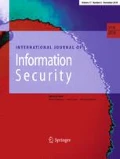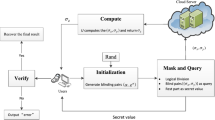Abstract
Reducing computational cost of cryptographic computations for resource-constrained devices is an active research area. One of the practical solutions is to securely outsource the computations to an external and more powerful cloud server. Modular exponentiations are the most expensive computation from the cryptographic point of view. Therefore, outsourcing modular exponentiations to a single, external and potentially untrusted cloud server while ensuring the security and privacy provides an efficient solution. In this paper, we propose new efficient outsourcing algorithms for modular exponentiations using only one untrusted cloud server. These algorithms cover public-base and private-exponent, private-base and public-exponent, private-base and private-exponent, more generally private-base and private-exponents simultaneous modular exponentiations. Our algorithms are the most efficient solutions utilizing only one single untrusted server with the best checkability probabilities. Furthermore, unlike existing schemes, which have fixed checkability probability, our algorithms provide adjustable predetermined checkability parameters. Finally, we apply our algorithms to outsource oblivious transfer protocols and blind signatures which are expensive primitives in modern cryptography.



Similar content being viewed by others
Notes
Note that disclosing both x and \(x^{-1} \mod \phi (n)\) for \(x \in \mathbb {Z}/n\mathbb {Z}\) allows an attacker to recover the factorization of the RSA modulus n.
References
Van Dijk, M., Juels, A.: On the impossibility of cryptography alone for privacy-preserving cloud computing. In: Proceedings of the 5th USENIX Conference on Hot Topics in Security (HotSec’10), pp. 1–8. USENIX Association (2010)
Chen, X., Li, J., Ma, J., Tang, Q., Lou, W.: New algorithms for secure outsourcing of modular exponentiations. In: Foresti, S., Yung, M., Martinelli, F. (eds.) Computer Security ESORICS 2012, volume 7459 of Lecture Notes in Computer Science, pp. 541–556. Springer, Berlin (2012)
Hohenberger, S., Lysyanskaya, A.: How to securely outsource cryptographic computations. In: Kilian, J. (ed.) Theory of Cryptography, volume 3378 of Lecture Notes in Computer Science, pp. 264–282. Springer, Berlin (2005)
Kuppusamy, P.G.L., Rangasamy, J.: On secure outsourcing of cryptographic computations to cloud. In: ACM Symposium on Information Computer and Communications Security (ASIACCS). ACM (2014)
Wang, Y., Wu, Q., Wong, D.S., Qin, B., Chow, S.S.M., Liu, Z., Tan, X.: Securely outsourcing exponentiations with single untrusted program for cloud storage. In: Kutyowski, M., Vaidya, J. (eds.) Computer Security—ESORICS 2014, volume 8712 of Lecture Notes in Computer Science, pp. 326–343. Springer, Berlin (2014)
Li, J., Wong, D., Li, J., Huang, X., Xiang, Y.: Secure outsourced attribute-based signatures. IEEE Trans. Parallel Distrib. Syst. 99 (preprints) (2014)
Nie, H., Chen, X., Li, J., Liu, J., Lou, W.: Efficient and verifiable algorithm for secure outsourcing of large-scale linear programming. In: 2014 IEEE 28th International Conference on Advanced Information Networking and Applications (AINA), pp. 591–596 (2014)
Beaver, D., Feigenbaum, J.: Hiding instances in multioracle queries. In: STACS 90, volume 415 of Lecture Notes in Computer Science, pp. 37–48. Springer, Berlin (1990)
Beaver, D., Feigenbaum, J., Kilian, J., Rogaway, P.: Locally random reductions: improvements and applications. J. Cryptol. 10(1), 17–36 (1997)
Abadi, M., Feigenbaum, J., Kilian, J.: On hiding information from an oracle. In: Proceedings of the Nineteenth Annual ACM Symposium on Theory of Computing (STOC ’87), pp. 195–203. ACM (1987)
Boyko, V., Peinado, M., Venkatesan, R.: Speeding up discrete log and factoring based schemes via precomputations. In: Advances in Cryptology EUROCRYPT’98, volume 1403 of Lecture Notes in Computer Science, pp. 221–235. Springer, Berlin (1998)
de Rooij, P.: On schnorrs preprocessing for digital signature schemes. J. Cryptol. 10(1), 1–16 (1997)
Matsumoto, T., Kato, K., Imai, H.: Speeding up secret computations with insecure auxiliary devices. In: Advances in Cryptology CRYPTO 88, volume 403 of Lecture Notes in Computer Science, pp. 497–506. Springer, New York (1990)
Nguyen, P.Q., Shparlinski, I.E., Stern, J.: Distribution of modular sums and the security of the server aided exponentiation. In: Cryptography and Computational Number Theory, volume 20 of Progress in Computer Science and Applied Logic, pp. 331–342. Birkhauser, Basel (2001)
Schnorr, C.P.: Efficient identification and signatures for smart cards. In: Quisquater, J.-J., Vandewalle, J. (eds.) Advances in Cryptology EUROCRYPT 89, volume 434 of Lecture Notes in Computer Science, pp. 688–689. Springer, Berlin (1990)
Schnorr, C.-P.: Efficient signature generation by smart cards. J. Cryptol. 4(3), 161–174 (1991)
Van Dijk, M., Clarke, D., Gassend, B., Edward Suh, G., Devadas, S.: Speeding up exponentiation using an untrusted computational resource. Des. Codes Cryptogr. 39, 253–273 (2006)
Fischlin, M., Fischlin, R.: Efficient non-malleable commitment schemes. J. Cryptol. 22(4), 530–571 (2009)
Cramer, R., Damgard, I., Schoenmakers, B.: Proofs of partial knowledge and simplified design of witness hiding protocols. In: Advances in Cryptology (CRYPTO 94), volume 839 of Lecture Notes in Computer Science, pp. 174–187. Springer, Berlin (1994)
El Gamal, T.: A public key cryptosystem and a signature scheme based on discrete logarithms. In: Proceedings of CRYPTO 84 on Advances in Cryptology, pp. 10–18. Springer, New York (1985)
Ma, X., Li, J., Zhang, F.: Outsourcing computation of modular exponentiations in cloud computing. Clust. Comput. 16(4), 787–796 (2013)
Liu, J., Yang, B., Du, Z.: Outsourcing of verifiable composite modular exponentiations. In: INCoS, pp. 546–551 (2013)
Yao, A.C.: Protocols for secure computations. In: Proceedings of the 23rd Annual Symposium on Foundations of Computer Science (SFCS ’82), pp. 160–164. IEEE Computer Society (1982)
Paillier, P.: Public-key cryptosystems based on composite degree residuosity classes. In: Advances in Cryptology EUROCRYPT 99, volume 1592 of Lecture Notes in Computer Science, pp. 223–238. Springer, Berlin (1999)
Boneh, D., Goh, E.-J., Nissim, K.: Evaluating 2-dnf formulas on ciphertexts. In: Theory of Cryptography, volume 3378 of Lecture Notes in Computer Science, pp. 325–341. Springer, Berlin (2005)
Gentry, C.: A Fully Homomorphic Encryption Scheme. PhD thesis, Stanford, CA, USA (2009)
Kilian, J.: Founding crytpography on oblivious transfer. In Proceedings of the Twentieth Annual ACM Symposium on Theory of Computing (STOC ’88), pp. 20–31. ACM, New York, NY, USA (1988)
Goldreich, O.: Foundations of Cryptography: Basic Applications, vol. 2. Cambridge University Press, New York (2004)
Lindell, Y., Pinkas, B.: A proof of security of yao’s protocol for two-party computation. J. Cryptol. 22(2), 161–188 (2009)
Di Crescenzo, G., Malkin, T., Ostrovsky, R.: Single database private information retrieval implies oblivious transfer. In: Advances in Cryptology EUROCRYPT 2000, volume 1807 of Lecture Notes in Computer Science, pp. 122–138. Springer, Berlin (2000)
Juels, A., Szydlo, M.: A two-server, sealed-bid auction protocol. In: Blaze, M. (ed.) Financial Cryptography, volume 2357 of Lecture Notes in Computer Science, pp. 72–86. Springer, Berlin (2003)
Lipmaa, H.: Verifiable homomorphic oblivious transfer and private equality test. In: Advances in Cryptology—ASIACRYPT 2003, volume 2894 of Lecture Notes in Computer Science, pp. 416–433. Springer, Berlin (2003)
Bringer, J., Chabanne, H., Patey, A.: Shade: Secure hamming distance computation from oblivious transfer. In: Financial Cryptography and Data Security, volume 7862 of Lecture Notes in Computer Science, pp. 164–176. Springer, Berlin (2013)
Chaum, D.: Blind signatures for untraceable payments. In: Chaum, D., Rivest, R.L., Sherman, A.T. (eds.) Advances in Cryptology, Proceedings of CRYPTO ’82, pp. 199–203. Springer, Berlin (1983)
Brands, S.A.: Rethinking Public Key Infrastructures and Digital Certificates: Building in Privacy. MIT Press, Cambridge (2000)
Cohen, H., Frey, G., Avanzi, R., Doche, C., Lange, T., Nguyen, K., Vercauteren, F.: Handbook of Elliptic and Hyperelliptic Curve Cryptography, 1st edn. Chapman & Hall, Boca Raton (2006)
Barbulescu, R., Gaudry, P., Joux, A., Thomé, E.: A quasi-polynomial algorithm for discrete logarithm in finite fields of small characteristic. CoRR, abs/1306.4244 (2013)
Conrad, K.: Stirlings formula (2011). http://www.math.uconn.edu/~kconrad/blurbs/analysis/stirling.pdf. Retrieved 28 May 2015
Horowitz, E., Sahni, S.: Computing partitions with applications to the knapsack problem. J. ACM 21(2), 277–292 (1974)
Lenstra Jr, A.K., Lenstra, H.W., Lovsz, L.: Factoring polynomials with rational coefficients. Math. Ann. 261(4), 515–534 (1982)
Coster, M.J., Joux, A., LaMacchia, B.A., Odlyzko, A.M., Schnorr, C.-P., Stern, J.: Improved low-density subset sum algorithms. Comput. Complex. 2(2), 111–128 (1992)
Schnorr, C.P., Euchner, M.: Lattice basis reduction: improved practical algorithms and solving subset sum problems. Math. Program. 66(1–3), 181–199 (1994)
Aumann, Y., Lindell, Y.: Security against covert adversaries: efficient protocols for realistic adversaries. J. Cryptol. 23(2), 281–343 (2010)
Di Crescenzo, G., Ostrovsky, R.: On concurrent zero-knowledge with pre-processing. In: Advances in Cryptology (CRYPTO 99), volume 1666 of Lecture Notes in Computer Science, pp. 485–502. Springer, Berlin (1999)
Pedersen, T.: Non-interactive and information-theoretic secure verifiable secret sharing. In: Advances in Cryptology (CRYPTO 91), volume 576 of Lecture Notes in Computer Science, pp. 129–140. Springer, Berlin (1992)
Cramer, R., Gennaro, R., Schoenmakers, B: A secure and optimally efficient multi-authority election scheme. In: Proceedings of the 16th Annual International Conference on Theory and Application of Cryptographic Techniques (EUROCRYPT’97), pp. 103–118. Springer, Berlin (1997)
Gennaro, R.: Multi-trapdoor commitments and their applications to proofs of knowledge secure under concurrent man-in-the-middle attacks. In: Advances in Cryptology (CRYPTO 2004), volume 3152 of Lecture Notes in Computer Science, pp. 220–236. Springer, Berlin (2004)
Seysen, M.: Using an rsa accelerator for modular inversion. In: Proceedings of the Cryptographic Hardware and Embedded Systems (CHES 2005), 7th International Workshop, Edinburgh, UK, August 29–September 1, 2005, volume 3659 of Lecture Notes in Computer Science, pp. 226–236. Springer, Berlin (2005)
Acknowledgments
This work is partly supported by a joint research project funded by Bundesministerium für Bildung und Forschung (BMBF), Germany (01DL12038), and TÜBİTAK, Turkey (TBAG-112T011). It is also partially supported by the project (114C027) funded by EU FP7-The Marie Curie Action and TÜBİTAK (2236-CO-FUNDED Brain Circulation Scheme). It has also been partially supported by the COST Action CRYPTACUS (IC1403).
Author information
Authors and Affiliations
Corresponding author
Rights and permissions
About this article
Cite this article
Kiraz, M.S., Uzunkol, O. Efficient and verifiable algorithms for secure outsourcing of cryptographic computations. Int. J. Inf. Secur. 15, 519–537 (2016). https://doi.org/10.1007/s10207-015-0308-7
Published:
Issue Date:
DOI: https://doi.org/10.1007/s10207-015-0308-7




